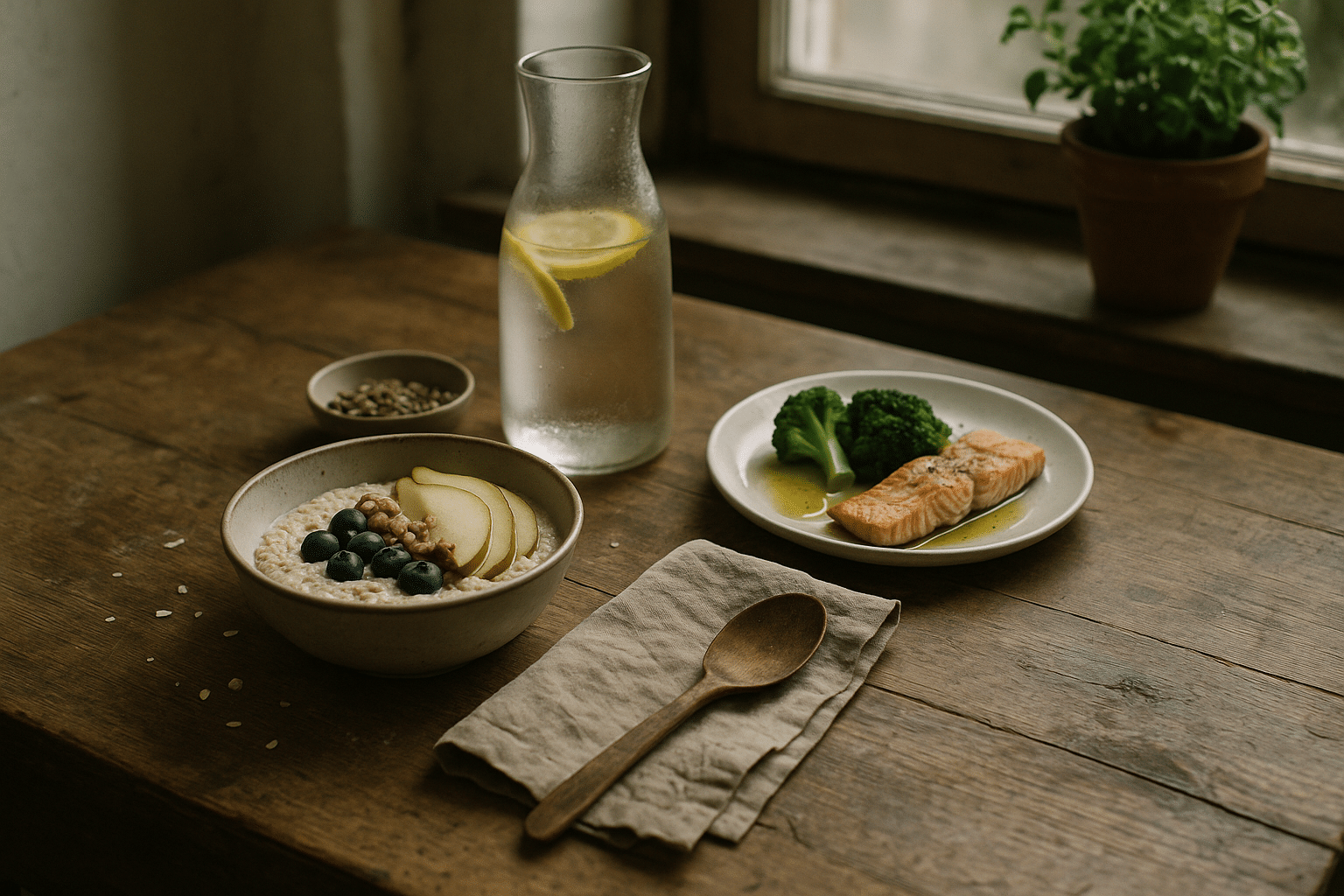
Everyday Habits That May Affect Sciatica Pain
Outline:
I. Sitting and posture: how chair height, backrest angle, and pelvic tilt change nerve load.
II. Sleep and recovery: positions and routines that soothe or stress the lower back.
III. Bending, lifting, and chores: technique traps that flare symptoms.
IV. Movement dosage: balancing sedentary time with activity to calm irritation.
V. Lifestyle factors: stress, weight, smoking, footwear, and commuting tweaks.
Introduction
Sciatica—a catch-all term for pain, tingling, or numbness radiating along the sciatic nerve—often flares not just because of one big event but due to dozens of small, repeatable habits. The nerve’s long path from the lower spine through the hips and down the legs means posture, pressure, and movement patterns matter. Estimates suggest a significant portion of adults will experience sciatica symptoms at some point, and while causes vary, daily routines can either aggravate or ease the burden. The goal here is practical: highlight the everyday choices that may nudge symptoms up or down, and offer realistic adjustments you can test safely.
Sitting, Posture, and the Hidden Load on Your Sciatic Nerve
Sitting is not “bad” in itself, but long, slouched sits can raise pressure on spinal discs and irritate tissues surrounding the nerve. Lab studies on intradiscal pressure have shown that seated flexion increases load compared with relaxed standing, especially when the pelvis tucks and the lower back rounds. Add a deep sofa or low car seat that tips your hips backward, and the spine can drift into a C-shape that places more demand on ligaments and discs. Prolonged compression around the hip can also irritate muscles near the nerve’s path, which is why a thick wallet in the back pocket can spark buttock or leg symptoms for some people.
Several posture cues are consistently helpful. Aim for a seat height that lets your hips be level with or slightly higher than your knees, feet flat, and weight shared between both sit bones. Let the backrest support your natural lumbar curve rather than propping yourself bolt upright; “neutral” isn’t rigid. Small tilts and micro-movements—shifting weight, uncrossing legs, standing for a minute—seem minor, but they rotate stress across tissues and can calm a sensitive system over time.
Quick adjustments to test today:
– Raise the chair or add a firm cushion so hips are just above knee height.
– Set the backrest to a slight recline (about 100–110 degrees) to reduce disc pressure versus sitting straight at 90 degrees.
– Keep feet grounded; if they dangle, use a footrest or a sturdy box.
– Remove items from back pockets to avoid direct compression.
– Use a gentle timer: stand or walk for 2–3 minutes every 30–45 minutes.
Data-wise, occupational studies have linked longer sitting time and awkward seated postures with higher rates of low back complaints, while interrupting sitting with short movement breaks correlates with less discomfort across the day. You do not need a perfect chair to make progress; a few low-cost changes can redistribute load and create more favorable conditions for a sensitive sciatic nerve. Think of your chair as a tool: when adjusted to your body and used with brief movement interludes, it can become part of the solution rather than a trigger.
Sleep and Recovery: Night Habits That Echo Through the Day
Nighttime is when tissues restore and the nervous system downshifts. If your sleeping setup holds your spine in a twisted or sagging position for hours, you may wake with stiff, irritable symptoms that echo into the workday. Research on mattress firmness suggests that very hard surfaces can increase pressure points while overly soft ones may let the hips sink, encouraging a flexed, rotated posture. Controlled trials have indicated that medium-firm surfaces often result in better back comfort than very firm ones, though personal preference, body weight, and sleep position all play roles.
Sleep positions can be tuned to support the lower back and hips. Side sleeping with a pillow between the knees helps keep the pelvis aligned and limits rotation through the lumbar spine. Back sleeping with a small pillow under the knees can decrease tension on the posterior chain and reduce arching. Stomach sleeping, while tolerable for some, often means neck rotation and lumbar extension; if it’s your go-to, a thin pillow and a small hip bolster may reduce strain. The principle is consistent: support natural curves, avoid long-end range positions, and keep the pelvis from dropping or twisting.
Position tweaks to experiment with:
– Side sleepers: place a pillow between knees and, if needed, a small one at the waist to fill the side gap.
– Back sleepers: slide a pillow under knees to soften pull on the lower back.
– Stomach sleepers: use the thinnest pillow you can tolerate; a light pad under one hip can reduce lumbar twist.
– Rotate or flip your mattress per manufacturer guidance to maintain even support; replace when sagging persists.
Routines also matter. Consistent sleep and wake times are linked with better pain tolerance and daytime energy. A brief wind-down—light stretching, a warm shower, or calm breathing—can lower muscle guarding that feeds nerve irritation. Morning stiffness is common; instead of abrupt bending to make the bed, take a minute to walk, sip water, and gently extend the hips before lifting or reaching. Quiet, predictable recovery time is not a luxury; it’s a practical input that helps your system process the mechanical stresses of the day.
Bending, Lifting, and Household Chores: Mechanics That Matter
Many flare-ups trace back to the way we reach for laundry, vacuum a hallway, or lift a grocery bag. The movement itself is not dangerous, but repeated, rushed motions at awkward angles can irritate sensitive tissues. Twisting while flexed and loaded—like lifting a crate from the trunk while your torso rotates—creates combined forces that the lower back may tolerate poorly when already inflamed. Household tasks add endurance demands; a spine that does fine for a minute may struggle after thirty minutes of the same pattern without rest.
The hip hinge is a simple, protective pattern: push the hips back, keep the spine in a comfortable neutral, and let the powerful glutes and hamstrings share the work. When lifting, bring the object close to the body, avoid jerky starts, and exhale through the effort to prevent breath-holding spikes in pressure. Split the load into lighter trips rather than one heroic haul. For chores that require forward reach, like dishwashing or brushing teeth, bring your feet closer to the counter and hinge slightly to avoid rounding through the low back.
Technique cues you can apply immediately:
– When picking up from the floor, hinge at the hips and bend the knees; keep the item close.
– Avoid twisting under load; pivot with your feet to turn your whole body.
– For vacuuming, step and lunge, keeping the tool close, rather than bending and reaching.
– Carry bags in both hands or use a backpack to distribute weight more evenly.
– Break long tasks into short rounds with one-minute movement or stretch breaks.
Consistency beats intensity. Rehearse the hinge with a broomstick along your spine for feedback: keep contact at the back of the head, mid-back, and sacrum as you bow. Over a week, these micro-skills can meaningfully reduce aggravating forces, not by eliminating movement but by steering it through stronger joints and muscles. You do not have to move “perfectly”—just a little more intentionally—so your sciatic nerve gets fewer surprise tugs from awkward angles.
Movement Dosage: Sedentary Time, Exercise, and the “Goldilocks” Zone
For irritated nerves, both “too little” and “too much too soon” can backfire. Long periods of sitting are associated with higher reports of back and leg pain, yet complete rest can decondition supportive muscles and heighten sensitivity. The sweet spot lives between these extremes: gradual, frequent movement that builds tolerance without spiking symptoms. Short, regular walks circulate blood, mobilize the hips, and provide gentle motion to the lumbar segments. Water-based exercise, cycling with minimal forward flexion, and controlled strength work can be added as symptoms settle.
Think in doses, not hero workouts. Many people tolerate 5–10 minutes of walking every hour far better than a single 60-minute session after eight hours of sitting. Gentle nerve glides, hip mobility drills, and core endurance work (planks, side planks, bird-dog variations) help build a buffer around the spine without heavy compressive loads. Early on, avoid exercises that demand deep spinal flexion under load if those reproduce symptoms; reintroduce progressively as comfort allows. A simple journal to track time, intensity, and next-day response can guide your progression and prevent the “boom-bust” cycle.
Sample weekly rhythm to test:
– Daily: two to four short walks (5–15 minutes), sprinkled through the day.
– Three days per week: 20–30 minutes of low-impact cardio (water exercise, upright cycling, or brisk walking).
– Two to three days per week: strength circuits focusing on hips, legs, and core with moderate effort.
– Most days: 5–10 minutes of mobility/nerve-glide work, avoiding symptom spikes.
Evidence from population studies suggests that people who meet moderate activity targets report fewer back-related limitations, while excessive sitting time correlates with greater discomfort. Still, individual responses vary. Use a “talk test” to keep intensity in check—you should be able to speak in full sentences—and progress by adding time before adding intensity. If pain shoots sharply, numbness spreads, or weakness appears, scale back and consult a qualified clinician. The aim is capacity, not punishment; motion is medicine when dosed thoughtfully.
Lifestyle Factors: Stress, Weight, Smoking, Footwear, and Commuting
Sciatica is mechanical and biological, but it is also influenced by the wider context of your life. Psychological stress can increase muscle guarding and amplify pain perception through the nervous system’s alarm pathways. Brief daily practices—slow breathing, a quiet walk outside, or a short body scan—can downshift tension, making the same mechanical loads feel less provocative. Sleep regularity, as covered earlier, reinforces this calming effect.
Body weight and metabolic health also interact with spinal load. Extra mass increases compressive forces on discs and joints, and abdominal fat may encourage a swayback or tucked posture depending on distribution. Gradual, sustainable nutrition and activity changes—aimed at energy balance and strength—tend to help more than extreme diets. Observational research links smoking with poorer disc health and higher odds of low back pain and sciatica, likely through reduced blood flow and tissue repair capacity; reducing or quitting is among the most meaningful long-term choices you can make for back health.
Seemingly small choices add up. Footwear with very high heels shifts weight forward and increases lumbar extension, while overly worn-out soles can alter gait mechanics. In commuting, prolonged sitting plus whole-body vibration—common in long drives—has been associated with higher rates of low back and sciatic symptoms in occupational groups. Practical tweaks: adjust the seat so hips are slightly higher than knees, bring the steering wheel within easy reach, use lumbar support in moderation, and plan brief standing breaks on longer trips. Keep phones at eye level to avoid hours of neck and thoracic slouch that ripple down to the lower back.
Habit swaps to start this week:
– Replace one long drive or sit with two shorter blocks separated by a leg-stretch break.
– Choose shoes with stable, moderate heels and retire pairs with uneven wear.
– Schedule a daily 5-minute breathing practice to reduce muscle guarding.
– If you smoke, speak with a healthcare professional about cessation supports.
– Prep a simple, protein-and-fiber-rich snack to steady energy and reduce end-of-day slumps.
No single change is a cure-all, but the cumulative effect of these adjustments can be substantial. Each one reduces a sliver of stress on the system—mechanical, metabolic, or psychological—giving irritated tissues a chance to quiet down. Over weeks, many people notice that flare-ups arrive less often and leave more quickly, even if occasional symptoms linger. That trajectory—steadier, more capable days—is a realistic and worthwhile target.
Conclusion: Small Tweaks, Meaningful Relief
Your daily routine can either pester an already sensitive sciatic nerve or give it room to recover. Sit a little taller, move a little more often, sleep a little smarter, and handle chores with a calmer, stronger pattern. Pair those with stress management, thoughtful footwear, and kinder commuting habits, and you stack the deck in your favor. Progress is rarely dramatic, but it is often steady; measure it in easier mornings, longer comfortable sits, and walks that feel more free. If symptoms worsen or you notice numbness or weakness, consult a qualified professional for tailored guidance.


